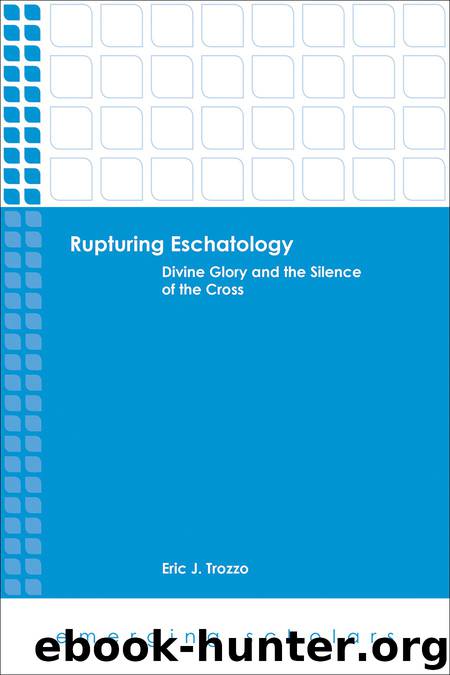Rupturing Eschatology by Trozzo Eric J

Author:Trozzo, Eric J. [Eric J. Trozzo]
Language: eng
Format: epub
ISBN: 978-1-4514-7976-8
Publisher: Fortress Press
Published: 2014-03-31T16:00:00+00:00
Confronting Divine Simplicity
As we encounter these proposals, let us keep in mind the theological stakes in the discussion of whether an abysmal opposition can be located within the divine. What is the nature of God and what can we know of the divine? Recall Philip Ruge-Jones’s contention that “The relationship that an interpreter assumes toward [‘On the Bondage of the Will’] often indicates structural keys to the larger picture that he or she presents of Luther.”[62] Indeed, I would suggest that the reaction indicates a great deal about a theologian’s larger project. This is demonstrated by the engagement of two seminal figures of twentieth-century theology, Karl Barth and Paul Tillich, with Luther’s concept of the “naked” God. Both agree that an attempt to hold the abyss within the divine risks a romp through unstable territory. Yet they show characteristically different levels of comfort in approaching Luther’s second form of divine hiddenness. Tillich is willing to give greater space than Barth to a logic of open transformation, even if he is skittish about taking it too far.
B. A. Gerrish, in his review of Reformation ideas of the hidden God that we encountered in chapter 1, notes that while there is a history of theological repression of Luther’s second sense of divine hiddenness reaching at least back to Albrecht Ritschl, “Karl Barth’s disapproval of the offending passages [in Luther’s writings] gave rise to a new flurry of interest [in the subject].”[63] In the second volume of his Church Dogmatics, Barth lays out his understanding of divine hiddenness. Barth, of course, is uninterested in any discussion of God outside of God’s revelation in Jesus Christ. The hidden God can only be talked about, for Barth, from within the field of God-given faith. Even God’s hiddenness is known only by revelation. He argues that God is invisible and ineffable in this world except “in Jesus Christ, in the proclamation of His name, in His witnesses and sacraments.” Thus God “is, therefore, visible only to faith and can be attested only by faith.”[64] Constituent of this faith is a trustworthiness that through the revelation in Christ God desires to be fully known to us. There cannot be, for Barth, an aspect of the divine that is incongruent with God’s revelation in Christ; otherwise God would not be trustworthy. Luther’s understanding of divine hiddenness does not make much of a direct appearance in Barth’s discussion on this point. Luther is given but a single fleeting, though telling, mention in this whole discourse, though as I noted, even this fleeting dismissal set off scholarly scurrying to uncover the offending passages in Luther. Barth contends, “But in the revelation of God there is no hidden God, no Deus absconditus, at the back of His revelation, with whose existence and activity we have also occasionally to reckon beyond His Word and His Spirit, and whom we have also to fear and honour behind His revelation. It may often look like this in certain contexts in Luther.”[65] Thus Barth not
Download
This site does not store any files on its server. We only index and link to content provided by other sites. Please contact the content providers to delete copyright contents if any and email us, we'll remove relevant links or contents immediately.
Under the Banner of Heaven: A Story of Violent Faith by Jon Krakauer(1787)
The Early Centuries - Byzantium 01 by John Julius Norwich(1727)
The Amish by Steven M. Nolt(1560)
Taken by J. C. Owens(1554)
In Spirit and Truth (In Spiritu Et Veritate Series) by Reed Zoe(1542)
Play It as It Lays by Joan Didion(1500)
The Apogee - Byzantium 02 by John Julius Norwich(1434)
The Last Man in Russia by Oliver Bullough(1387)
David Sedaris Diaries by David Sedaris(1283)
A History of the Amish by Steven M. Nolt(1273)
The Dance of Change by unknow(1250)
Leaving the Witness by Amber Scorah(1242)
Fallen by unknow(1207)
Tears of the Silenced: A True Crime and an American Tragedy; Severe Child Abuse and Leaving the Amish by Misty Griffin(1191)
The Angel of Forest Hill by Cindy Woodsmall(1139)
Deep Blue by unknow(1135)
The Best of Amish Cooking by Phyllis Pellman Good(1130)
The Ariana Trilogy by Rachel Ann Nunes(1117)
Escape by Carolyn Jessop & Laura Palmer(1101)
